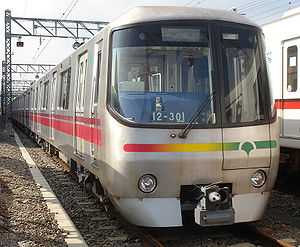Toei 5300 series
From Wikipedia, the free encyclopedia
| Toei 5300 series | |
|---|---|
 Toei 5300 series, February 2006 | |
| In service | 1991-present |
| Manufacturer | Kawasaki Heavy Industries, Nippon Sharyo, Kinki Sharyo, Hitachi |
| Replaced | Toei 5000 series |
| Constructed | 1990-1997 |
| Number built | 216 vehicles (27 sets) |
| Formation | 8 cars per trainset |
| Operator | Toei Subway |
| Line(s) served | Toei Asakusa Line |
| Specifications | |
| Car length | 18,000 mm (59 ft 1 in) |
| Width | 2,800 mm (9 ft 2 in) |
| Height | 4,050 mm (13 ft 3 in) |
| Doors | 3 pairs per side |
| Maximum speed | 110 km/h (70 mph) |
| Traction system | GTO-VVVF |
| Acceleration | 3.3 km/h/s |
| Deceleration |
4.0 km/h/s (service) 4.5 km/h/s (emergency) |
| Bogies | KD302, KD302A |
| Safety system(s) | C-ATS |
| Track gauge | 1,435 mm (4 ft 8 1⁄2 in) |
The Toei 5300 series (東京都交通局5300形) is an electric multiple unit (EMU) train type operated by Toei Subway on the Toei Asakusa Line in Tokyo, Japan.
The 5300 series was introduced on March 31, 1991 to replace aging Toei 5000 series trains which operated on the Toei Asakusa Line since its opening in 1960.[citation needed]
| |||||||||||||||||
This article is issued from Wikipedia. The text is available under the Creative Commons Attribution/Share Alike; additional terms may apply for the media files.
